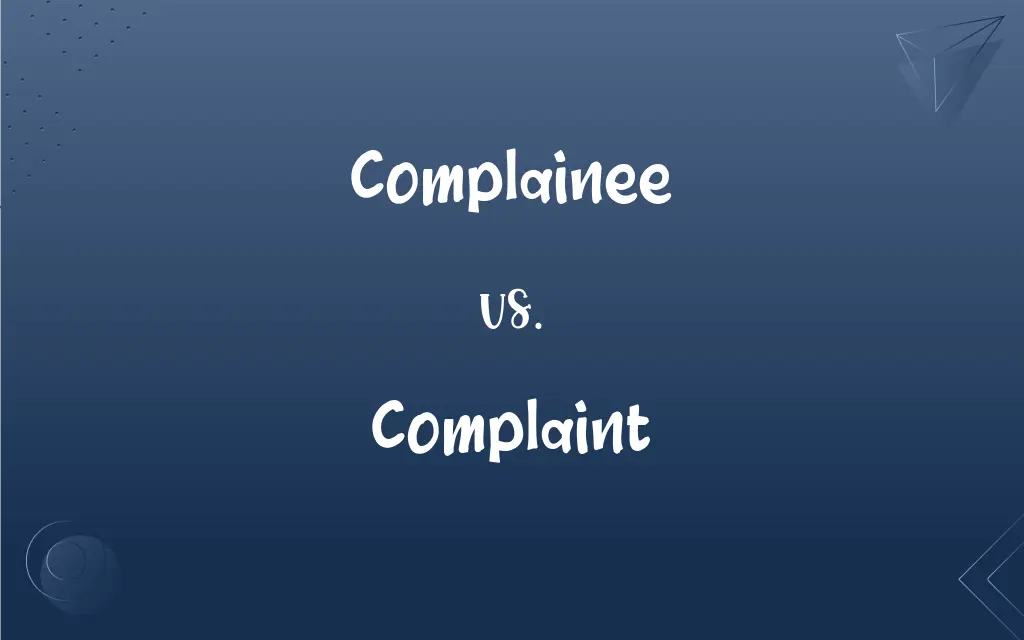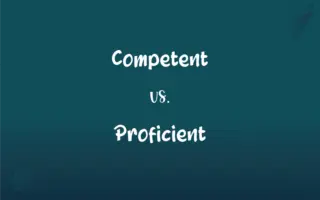Complainee vs. Complaint: What's the Difference?
Edited by Janet White || By Harlon Moss || Updated on November 13, 2023
Complainee refers to the person against whom a complaint is made. Complaint is a formal expression of dissatisfaction or grievance.

Key Differences
Complainee is a term used to identify the individual or entity that is the subject of a complaint. It highlights the recipient of the grievance. Complaint, conversely, is the actual expression of dissatisfaction, usually regarding a problem or issue. It is the act or document where the issues or grievances are articulated.
In a formal setting, such as a workplace or legal environment, the complainee is the person or organization being complained about. A complaint is used in various contexts, ranging from informal expressions of dissatisfaction to formal legal documents.
The term complainee is neutral, merely designating a position in a grievance process. Complaint often carries a negative connotation, as it involves expressing discontent or reporting a problem.
Complainee does not have a structured form and is used primarily as a reference in a complaint process. A complaint can be verbal or written, often following a specific format, especially in formal or legal settings.
The role of a complainee is passive, being the subject of the complaint. The purpose of a complaint is to initiate action or change regarding the issue at hand, making it an active tool for addressing grievances.
ADVERTISEMENT
Comparison Chart
Definition
Person against whom a complaint is made.
Formal expression of dissatisfaction or grievance.
Usage Context
Specific to the subject of a grievance.
Broad, ranging from informal to legal contexts.
Connotation
Neutral, indicating a role.
Often negative, implying problems or issues.
Form
Used as a reference in the complaint process.
Can be verbal or written, sometimes with a specific format.
Purpose
Passive role in the complaint process.
Active tool for expressing dissatisfaction and seeking resolution.
ADVERTISEMENT
Complainee and Complaint Definitions
Complainee
The individual or entity about whom a complaint is made.
The manager was the complainee in the employee's grievance.
Complaint
A statement of grievance in a workplace or public setting.
His complaint about workplace safety led to an investigation.
Complainee
The party being reported or complained about.
The city council was the complainee in the public's complaint about zoning changes.
Complaint
An expression of dissatisfaction or a report of a problem.
She filed a complaint about the poor service at the restaurant.
Complainee
A person or group being accused or reported in a complaint.
In the customer's feedback, the rude staff member became the complainee.
Complaint
An expression of discontent or objection.
The customer's complaint was about the delay in delivery.
Complainee
The recipient of a grievance or dissatisfaction.
The landlord became the complainee in the tenant's noise complaint.
Complaint
A documented report of unsatisfactory conditions or services.
They submitted a written complaint to the city about the road conditions.
Complainee
The subject or target of a formal grievance.
In the lawsuit, the corporation was listed as the complainee.
Complaint
A formal allegation against a person or entity.
The legal complaint accused the company of false advertising.
Complainee
One who is complained about; the subject of a complaint.
Complaint
An expression of pain, dissatisfaction, or resentment.
Complaint
A cause or reason for complaining; a grievance
What is your complaint?.
FAQs
Is the complainee always at fault?
Not necessarily; it depends on the outcome of the grievance process.
Can a complainee also have a complaint?
Yes, they can be a complainee in one context and have their own complaints in another.
How is a complaint resolved?
Through investigation, mediation, or legal processes, depending on the context.
What constitutes a formal complaint?
A written or verbal expression of dissatisfaction following a specific format.
Can complaints be anonymous?
Yes, in certain contexts, complaints can be made anonymously.
Are complainees allowed to rebut a complaint?
Yes, they typically have the opportunity to respond.
How is a complainee notified of a complaint?
Usually in writing or through official channels in a formal setting.
Can a company be a complainee?
Yes, organizations can be complainees in complaints.
Who is a complainee in a workplace dispute?
The individual or group being complained about.
What role does a complaint play in customer service?
It's a tool for customers to express dissatisfaction and seek resolution.
Are all complaints formal?
No, they can range from informal remarks to formal legal documents.
Can multiple people be complainees in a single complaint?
Yes, if the complaint is about multiple individuals or entities.
What happens after a complaint is filed?
It triggers a review or investigation process.
What rights does a complainee have?
The right to know the complaint details and to respond or defend themselves.
Can a complaint lead to legal action?
Yes, in cases of serious grievances or legal violations.
Are verbal complaints taken as seriously as written ones?
In formal settings, written complaints usually carry more weight.
Does a complainee need a lawyer?
In legal situations, it's advisable.
Can a complaint be withdrawn?
Yes, depending on the situation and policies in place.
How important is evidence in a complaint?
Crucial, especially in formal or legal complaints.
Is a complaint always negative?
Generally, yes, as it expresses dissatisfaction.
About Author
Written by
Harlon MossHarlon is a seasoned quality moderator and accomplished content writer for Difference Wiki. An alumnus of the prestigious University of California, he earned his degree in Computer Science. Leveraging his academic background, Harlon brings a meticulous and informed perspective to his work, ensuring content accuracy and excellence.
Edited by
Janet WhiteJanet White has been an esteemed writer and blogger for Difference Wiki. Holding a Master's degree in Science and Medical Journalism from the prestigious Boston University, she has consistently demonstrated her expertise and passion for her field. When she's not immersed in her work, Janet relishes her time exercising, delving into a good book, and cherishing moments with friends and family.































































